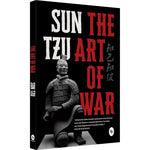- Home
- Non-Fiction
- The Art Of War
The Art Of War
Couldn't load pickup availability
Summary
The Art of War by Sun Tzu is an ancient Chinese military treatise that has transcended its original purpose of providing strategies for warfare. It has been widely regarded as one of the most influential works on strategy, leadership, and decision-making. Written over two millennia ago, the book is divided into 13 chapters, each dedicated to a different aspect of warfare. Sun Tzu's core philosophy revolves around the principles of careful preparation, adaptability, and psychological warfare. While it is a manual for battle, its teachings have been adapted for various fields, including business, politics, and personal development.
The essence of the book is the understanding that war (or any conflict) is not just about brute force, but about strategy, intelligence, and understanding the environment. Sun Tzu emphasizes the importance of flexibility, timing, and knowing when to fight and when to avoid conflict. His insights into leadership, deception, and the value of preparation remain highly relevant today.
Key Points from The Art of War
-
Know Yourself and Your Enemy
Sun Tzu famously writes, "If you know the enemy and know yourself, you need not fear the result of a hundred battles." The key to success is understanding both your strengths and weaknesses, as well as the capabilities and intentions of your adversary. Knowledge and intelligence are the most powerful weapons in any conflict. -
Waging War with Strategy and Deception
Victory is often achieved through strategy rather than sheer force. Sun Tzu advocates for the use of deception, surprise, and misdirection to confuse and overwhelm opponents. Winning without fighting is the ideal, and creating uncertainty in the enemy's mind is a vital tactic. -
The Importance of Adaptability
Flexibility and the ability to adapt to changing circumstances are essential in any conflict. Sun Tzu emphasizes that a rigid, one-dimensional approach is destined for failure. Success lies in being fluid, reacting to the environment, and adjusting strategies as necessary. -
The Role of Leadership and Discipline
A good leader must be decisive, calm, and capable of maintaining control over the situation. Sun Tzu stresses that leadership is about maintaining the moral high ground and ensuring discipline within the ranks. Leaders must inspire confidence and lead by example. -
The Value of Timing and Preparation
Sun Tzu highlights the importance of proper timing in both the preparation for and execution of a plan. Properly timed moves can provide a strategic advantage, while acting prematurely or without adequate preparation can lead to failure. Patience and readiness are critical to ensuring success when the opportunity arises.







